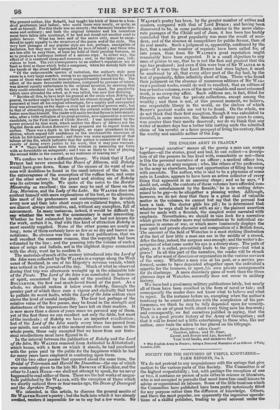THE ENGLISH ARMY IN FRANCE.*
IF " personal narrative" means all the gossip a man can scrape together—all the stories, good and bad, he can collect—a descrip- tion of all the persons he has lived with, remarkable or not—then is this the personal narrative of an officer; a medical officer too, that is to lay, an army surgeon ; who, like others of his profession, in the army as elsewhere, has vast opportunities of filling his scrap with anecdote. The author, who is said to be a physician of some note in London, appears to have been an active collector of every- thing that appeared in an amusing shape ; and as he says, "1 doubt not, orally, the contents of these volumes have afforded con. siderable entertainment by the fireside," he is in writing deter- mined to be gay—to be altogether a pleasing writer. Although, however, we do not deny that there is a great deal of valuable matter in the volumes, we cannot but say that the perusal has been a task. The doctor gilds his pill ; he is determined that whatever he °says shall be said with an air ; the plainest assertion must be made with a flourish, the simplest event narrated with' emphasis. Nevertheless, we should in vain look for a narrative- which gives the reader more real information as to individual ex- perience in scenes of war, or which more luminously displays the- true spirit and private character and composition of a British force. The account of the field of' Waterloo is a most striking illustration of the fact of how little a man can see in the middle of a crowd. After the fray, indeed, the surgeon sees enough; and the writer's de- scription of what came under his eye is a dreary story. The path of glory, as it is called, proverbially leads to the grave—but what a grave! In all this part of the narrative, the reader will be struck by the utter want of direction or organization in the various services of the army. Whether a man was at his post, or a service per- formed, seems to have depended altogether upon the individual's appetite for the business, or uponais own private arrangements for its discharge. A more disorderly piece of work than the three glorious days of Waterloo, assuredly does not occur in military history. We have had a good many military publications lately, but nearly all of them have been couched in the form of novel or tale ; and consequently the reader does not know what to believe and what to reject. In the instance before us, excepting when the author's tendency to be smart interferes with the complexion of his per- formance, we think he may be fully depended upon for veracity. There is an air of great truth about every thing save his bon mote; and consequently, we feel ourselves justified in saying, that the book is a good private history of the Army of Occupation ; and that it will be found not a little entertaining to those who, like our author, once bade the adieu he has placed on his titlepage.
"Adieu Boulogne ! adieu Cassel! Camlrai, adieu; and St. Omer, Escant, and Scarpe and Lys, farewell Your level banks, and meadows fair."
* The English Army in France; being a Personal Narrative of an Officer. 2 Ws; London, 1830.


























 Previous page
Previous page